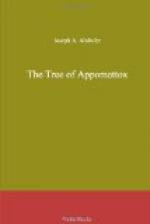“Certainly, general,” replied Grant. “For how many men do you need them?”
“About twenty-five thousand,” was Lee’s reply.
Then General Grant requested him to send his own officers to Appomattox Station for the food and forage. Lee thanked him. They bowed to each other again, and the Southern leader who no longer had an army, but who retained always the love and veneration of the South, left the McLean house. Thus and in this simple fashion—the small detached fighting elsewhere did not count—did the great civil war in America, which had cost six or seven hundred thousand lives, and the temporary ruin of one section, come to an end.
Dick saw Lee come out of the house, mount Traveler and, followed by Colonel Marshall, ride back toward his own men who already had divined the occurrences in the house. The army saluted him with undivided affection, the troops crowding around him, cheering him, and, whenever they had a chance, shaking his hand. The demonstration became so great that Lee was moved deeply and showed it. The water rose in his eyes and his voice trembled as he said, though with pride:
“My lads, we have fought through the war together. I have done the best I could for you. My heart is too full to say more.”
He could not be induced to speak further, although the great demonstration continued, but rode in silence to his headquarters in a wood, where he entered his tent and sat alone, no one ever knowing what his thoughts were in that hour.
Twenty-six thousand men who were left of the Army of Northern Virginia surrendered the next day, and the blue and the gray fraternized. The Union soldiers did not wait for the rations ordered by Grant, but gave of their own to the starved men who were so lately their foes. Dick and his friends hastened at once to find Harry Kenton and his comrades, and presently they saw them all sitting together on a log, thin and pale, but with no abatement of pride. Harry rose nevertheless, and received his cousin joyfully.
“Dick,” he said as their hands met, “the war is over, and over forever. But you and I were never enemies.”
“That’s so, Harry,” said Dick Mason, “and the thing for us to do now is to go back to Kentucky, and begin life where we left it off.”
“But you don’t start this minute,” said Warner. “There is a small matter of business to be transacted first. We know all of you, but just the same we’ve brought our visiting cards with us.”
“I don’t understand,” said Harry.
“We’ll show you. Frank Pennington, remove that large protuberance from beneath your blouse. Behold it! A small ham, my friends, and it’s for you. That’s Frank’s card. And here I take from my own blouse the half of a cheese, which I beg you to accept with my compliments. Dick, you rascal, what’s that you have under your arm?”
“It’s a jar of prime bacon that I’ve brought along for the party, George.”




